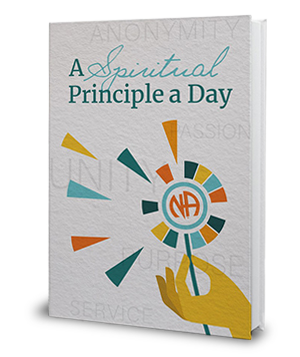Welcome to Narcotics Anonymous of NJ. Our Message Is…
That an addict, any addict can stop using drugs,
lose the desire to use, and find a new way to live.
Helpline
If you feel you have a problem with drugs, call our helpline
Events
See upcoming NA events and activities in NJ
Narcotics Anonymous is a nonprofit fellowship or society of men and women for whom drugs had become a major problem. We are recovering addicts who meet regularly to help each other stay clean.
– Narcotics Anonymous Basic Text, page 9
Recovery from addiction is possible and available through the 12 Steps and 12 Traditions of Narcotics Anonymous.
Narcotics Anonymous is FREEDOM from active addiction.
Narcotics Anonymous is an international, community-based association of recovering drug addicts with over 61,000 weekly meetings in over 131 countries worldwide.

Just for Today
Most of us pay lip-service to the value of conscious contact with a Higher Power. Yet how many of us consistently take time to improve that conscious contact? If we've not already established a regular regimen of prayer and meditation, today is the day to start one.
A "quiet time" need not be long. Many of us find that twenty to thirty minutes is enough time to quiet ourselves, focus our attention with a spiritual reading, share our thoughts and concerns in prayer, and take a few moments to listen for an answer in meditation. Our "quiet time" need not be lengthy to be effective, provided it is consistent. Twenty minutes taken once a month to pray will probably do little but frustrate us with the poor quality of our conscious contact. Twenty minutes taken regularly each day, however, renews and reinforces an already lively contact with our Higher Power.
In the hustle and bustle of the recovering addict's day, many of us end up going from morning to night without taking time out to improve our conscious contact with the God we've come to understand. However, if we set aside a particular time of the day, every day, as "quiet time," we can be sure that our conscious contact will improve.
A Spiritual Principal a Day
Many of us have had the experience of hearing someone else tell our story. We love it when we recognize ourselves in the details of how another member went about "getting and using and finding ways and means to get more." Relating to the specifics is far from typical, however, so how is it that we identify with others' experience when, really, it's not our own?
Identification doesn't require that we come from the same place. After all, hitting "rock bottom" often has little to do with our circumstances. Our willingness to give recovery a try can emerge in wildly different contexts. One member shared, "By outward appearances, I had it all. And yet, I felt isolated and alone, filled with fear, resentment, and regret." Another recalled, "The source of my desperation wasn't living on the streets. It came from that hollow ache of hopelessness, shame, and sadness deep inside me." Many of us will relate to both stories--and so many more--because they express the emotional state that precedes the gift of desperation.
We share a few telling particulars in our stories because it keeps us in touch with where we came from and what awaits us should we return to using. We revisit that desperation and touch base with our First Step. And that's where we connect, too. Empathy has the power to bind us together regardless of our stories. One member shared, "The disease will tell me 'you're not like these people,' but my spirit can't help but connect when I focus on the feelings."
As we stay clean and experience the Twelve Steps, our ability to connect with heart and spirit expands. Beyond the using stories that qualify us as drug addicts, we share a common path, a spiritual program in which we learn to practice living principle-centered lives. Recovery gives us access to the range of emotions we'll need to respond to life's ups and downs. When NA groups make it safe for intimate sharing, we can summon the courage to share our feelings--good, bad, and ugly--and make room for empathy to emerge.

